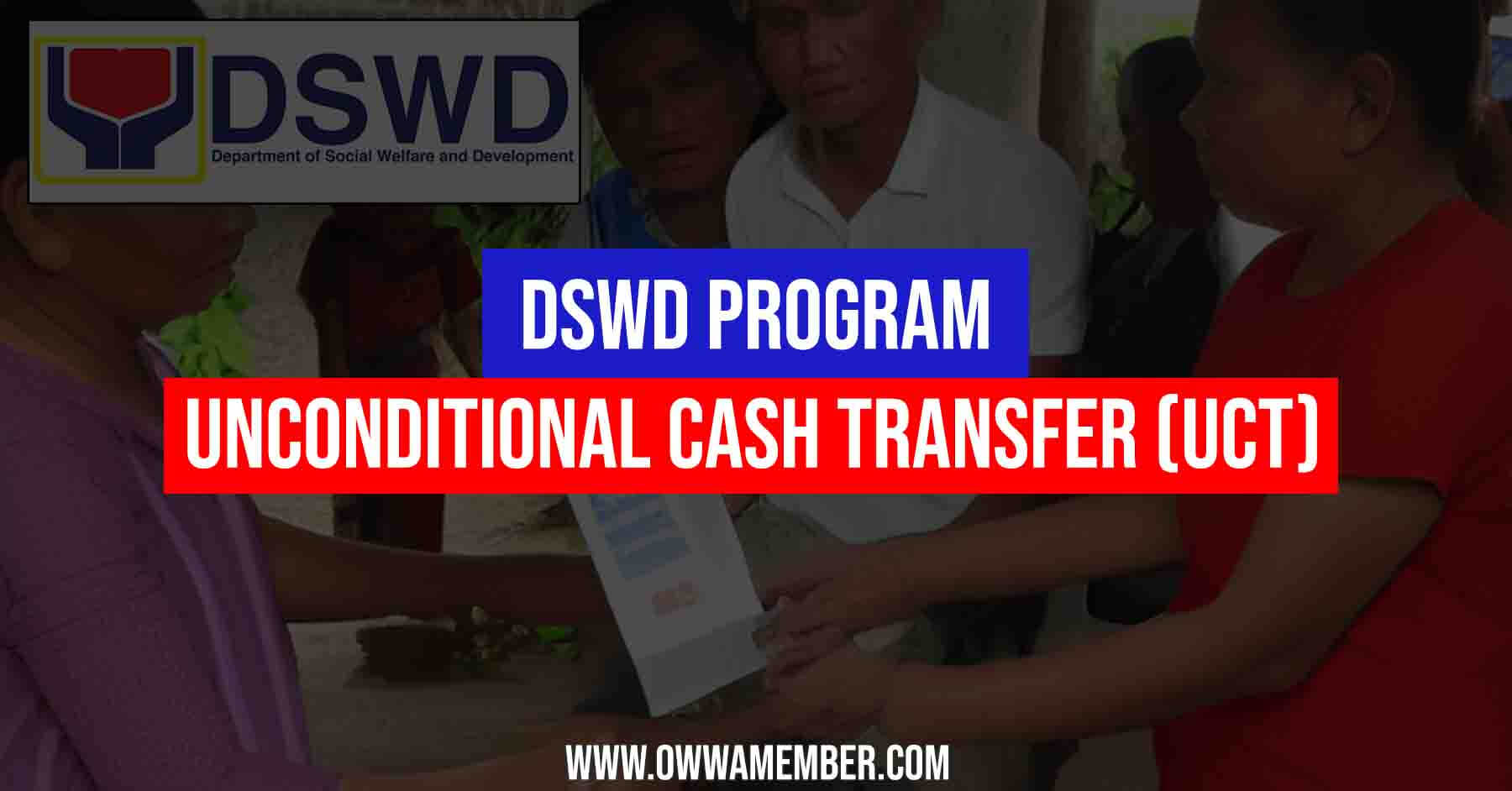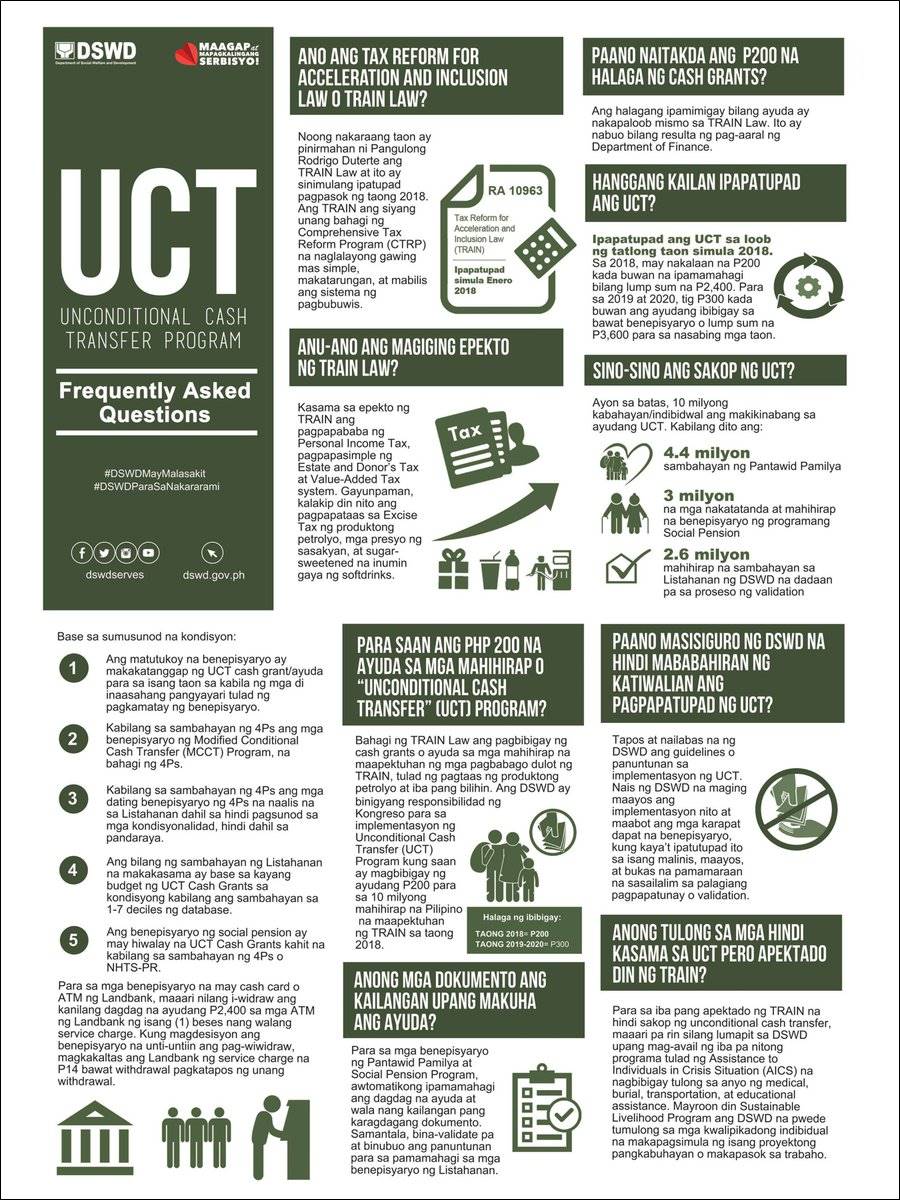The Department of Social Welfare and Development (DSWD) has been implementing the Unconditional Cash Transfer (UCT) program since 2013. The UCT program is a national government initiative that provides cash assistance to households that are considered to be in extreme poverty.
Also Read: List of DSWD Programs and Services for Filipinos
The goal of the UCT program is to reduce poverty and vulnerability by providing conditional cash transfers to eligible households. The UCT program is one of the key programs of the Philippine government’s poverty reduction strategy.
Contents
- What is the DSWD Unconditional Cash Transfer Program?
- What Are The Benefits Of DSWD Unconditional Cash Transfer Program
- Who Can Benefit From Unconditional Cash Transfer Program
- Who Is Eligible For The DSWD Unconditional Cash Transfer Program?
- Requirements Of DSWD Unconditional Cash Transfer Program
- Video: Unconditional Cash Transfer Program
- Frequently Asked Questions
- Summary

What is the DSWD Unconditional Cash Transfer Program?
The Unconditional Cash Transfer Program is one of the Philippine government’s flagship poverty alleviation programs. It is a direct response to the needs of low-income households who are struggling to make ends meet amid rising prices of basic goods and services.
The program is managed by the Department of Social Welfare and Development (DSWD), which is responsible for identifying eligible households and distributing the cash grants.
There are two key features of the DSWD UCT program:
1. The cash transfer is provided on a monthly basis.
2. The cash transfer is provided unconditionally, which means that there are no strings attached. Households can use the cash for whatever purpose they deem fit.
UCT offers eligible recipients cash grants calculated at 200 Pesos (PhP 200.00) per month during the first year of implementation and at 300 Pesos (PhP 300.00) per month during each consecutive year of implementation.
What Are The Benefits Of DSWD Unconditional Cash Transfer Program
The UCT program helps reduce poverty in two ways. First, by giving cash grants to low-income households, it provides them with a much-needed safety net that can help them make ends meet.
Second, because the cash grants can be used for any purpose, it gives recipients the flexibility to use the money in whatever way they see fit. This means that they can use the money to buy food, pay for utilities, or even start a small business.
In addition to reducing poverty, the UCT program also helps to reduce inequality in society. This is because the cash grants are targeted at low-income households—households that are more likely to be living in poverty. By giving these households cash grants, it helps to close the gap between them and wealthier households.
Who Can Benefit From Unconditional Cash Transfer Program
Beneficiaries of the Unconditional Cash Transfer program must fit the following criteria:
- households participating in the Pantawid Pamilyang Pilipino Program.
- As amended by Republic Acts No. 9257 and 9994, beneficiaries of the Social Pension Program under Republic Act No. 7432 (Social Pension Beneficiaries)., and
- Other low-income households in the National Household Targeting System for Poverty Reduction (NHTS-PR) database, provided they are in the first to seventh deciles, ranked by poverty rate (p (NHTS-PR Households).
Who Is Eligible For The DSWD Unconditional Cash Transfer Program?
To be eligible for the DSWD UCT program, households must meet the following criteria:
- Households must be located in areas that have been identified as poverty hotspots by the National Statistical Coordination Board (NSCB).
- Other forms of government cash assistance must not be received by households, such as 4Ps or Social Amelioration Program (SAP).
- Households must have a valid identification card, such as a driver’s license or passport, that can be used to verify their identity and address.
- Additional low-income households in the National Household Targeting System for Poverty Reduction (NHTS-PR) database, provided they are in the first through seventh deciles, ranked by expected income (NHTS-PR Households).
- Households must not have any outstanding debts with the government, such as unpaid taxes or utility bills.
Requirements Of DSWD Unconditional Cash Transfer Program
Beneficiaries Of UCT Listahanan Enroll In Cash Cards
- A photocopy of any acceptable ID (such as a GSIS UMID or voter’s ID)
- 2×2 ID photo
- properly completed Form for Know-Your-Customer (KYC) (from LBP)
- Payouts made over the counter:
- For grantees who will be in person:
- Valid ID (if no valid ID, Barangay Certification with Full Name, Birthdate, and Mother’s Name is acceptable)
- Certificate of Name Discrepancy (for beneficiaries whose names appear differently on their valid ID than they do on their payroll).
For Authorized Representative
- Grantees who, owing to unforeseen circumstances, are unable to attend payout should contact their authorized representative (e.g., medical condition, working away)
- Valid ID of the Grantee (or, in the absence of a valid ID, a Barangay Certification confirming the Full Name, Date of Birth, and Mother’s Name)
- Valid ID of the authorized representative (or, in the absence of a valid ID, a barangay certification with the representative’s full name, birthdate, and mother’s name)
- Letter of Permission
Deceased Grantees
- In the absence of a legitimate ID, the grantee must present a barangay certification that includes their full name, date of birth, and mother’s name.
- In the absence of a valid ID, the barangay certification must include the authorized representative’s full name, date of birth, and mother’s name.
- Any document proving the dead grantee’s connection to the designated representative (such as a marriage certificate or birth certificate).
- Special Power of Attorney or Proof Authority.

Video: Unconditional Cash Transfer Program
The Department of Social Welfare and Development (DSWD) is currently accepting applications for its Unconditional Cash Transfer (UCT) Program. The UCT Program provides cash assistance to eligible indigent families to help them meet their basic needs.
To learn more about the DSWD Unconditional Cash Transfer Program, watch the video below.
https://www.youtube.com/watch?v=RI68Nwk2ZEw
Frequently Asked Questions
1. Are Unconditional Cash Transfers Effective?
Supporters of unconditional cash transfers argue that they are an effective way to address poverty. They point to evidence that shows that such transfers can increase annual household consumption by 0.35 per unit of transfer. They also argue that cash transfers can help to reduce inequality and provide a safety net for the most vulnerable members of society.
2. What Is The Purpose Of Unconditional Cash Transfer Program?
The Department of Social Welfare and Development Unconditional Cash Transfer program is a government subsidy that provides cash assistance to eligible low-income households.
The program is designed to help meet the basic needs of food, shelter, and clothing. It also provides a safety net for families who are struggling to make ends meet. The cash transfer is deposited into the beneficiary’s bank account and can be used for any purpose.
3. What Are The Benefits Of Cash Transfer?
There are many different cash transfer programs available, each with its own unique benefits. For example, some programs provide a one-time payment to help cover the cost of an unexpected expense, such as a medical bill or car repair.
Others provide ongoing payments to help with living expenses, such as rent or food. And still others provide both one-time and ongoing payments, giving recipients the flexibility to use the money as they see fit.
No matter what type of cash transfer program you choose, you can be sure that the benefits will far outweigh the costs.
4. How Much Does Unconditional Cash Transfer Cost?
The Department of Social Welfare and Development Unconditional Cash Transfer program is a government subsidy that provides cash assistance to eligible low-income households. The program is designed to help meet the basic needs of food, shelter, and clothing. It also provides a safety net for families who are struggling to make ends meet. The cash transfer is deposited into the beneficiary’s bank account and can be used for any purpose. There are no strings attached to the money, which means that recipients can use it however they see fit.
5. How Do I Apply For Unconditional Cash Transfer?
To apply for the DSWD Unconditional Cash Transfer program, you must complete an application form and submit it to the nearest DSWD office. You can find the application form on the DSWD website.
Summary
The DSWD Unconditional Cash Transfer (UCT) program is a national government initiative that provides cash assistance to households that are considered to be in extreme poverty. The goal of the UCT program is to reduce poverty and vulnerability by providing conditional cash transfers to eligible households.
If you believe your household meets the eligibility criteria listed above, we encourage you to apply for the UCT program today.